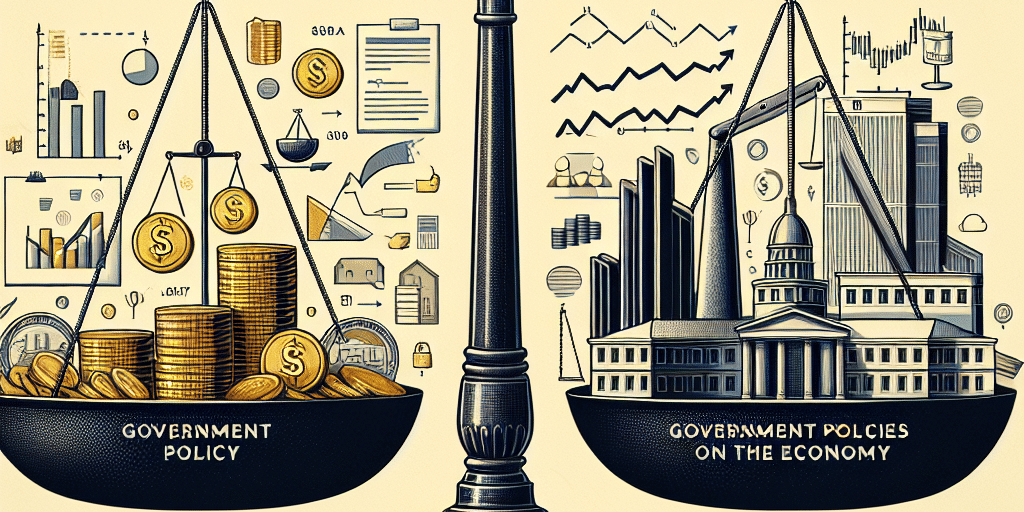Title: The Impact of Government Policies on the Economy
Government policies play a pivotal role in shaping the economic landscape of a nation. Through various regulatory frameworks, fiscal strategies, and monetary policies, governments influence economic growth, stability, and the overall prosperity of their citizens. This article explores the multifaceted impact of government policies on the economy, highlighting both the positive outcomes and potential drawbacks.
Fiscal Policy: Balancing Growth and Stability
Fiscal policy involves government spending and taxation decisions, designed to influence economic activity. During economic downturns, governments often implement expansionary fiscal policies, such as increased public spending and tax cuts, to stimulate demand and boost economic growth. For instance, the economic responses to the COVID-19 pandemic saw countries deploying extensive fiscal measures to support businesses and individuals, averting deeper recessions.
Conversely, during periods of robust economic growth, governments may adopt contractionary fiscal policies, reducing spending or increasing taxes to prevent overheating and control inflation. Striking the right balance is crucial, as excessive spending can lead to mounting debt, while austere measures can stifle economic dynamism.
Monetary Policy: Steering Through Interest Rates and Money Supply
Central banks, through monetary policy, influence the economy by adjusting interest rates and controlling the money supply. Lower interest rates tend to encourage borrowing and investment, fostering economic activity. Conversely, higher rates can cool an overheating economy by making borrowing more expensive, thus controlling inflationary pressures.
Quantitative easing, a form of monetary policy used during financial crises, involves central banks purchasing government securities to inject liquidity into the economy. This was prominently employed during the 2008 financial crisis and the COVID-19 pandemic, highlighting its significance in stabilizing financial systems.
Regulatory Policies: Ensuring Fair Play and Stability
Regulatory policies encompass various measures to ensure fair competition, consumer protection, and environmental sustainability. By setting standards and enforcing compliance, governments can prevent monopolies, protect consumers from unfair practices, and ensure sustainable economic development.
However, over-regulation can stifle innovation and burden businesses, especially small and medium enterprises, with excessive compliance costs. Thus, achieving a regulatory balance that fosters a conducive business environment while safeguarding public interests is a continuous challenge for policymakers.
Trade Policies: Navigating the Global Market
Trade policies, including tariffs, trade agreements, and import/export regulations, significantly impact a nation’s economy. By opening markets and reducing trade barriers, governments can enhance competitiveness, access to resources, and economic efficiency. Conversely, protectionist measures can shield domestic industries from foreign competition but may also lead to retaliatory actions and trade wars.
The ongoing global discussion on trade highlights the tension between the benefits of globalization and the need to protect national economic interests. Effective trade policies require a nuanced understanding of both international dynamics and domestic industry needs.
Social Policies: Investing in Human Capital
Government investments in education, healthcare, and social welfare are crucial for long-term economic prosperity. Such policies not only improve individual well-being but also enhance labor productivity and innovation potential. By investing in human capital, countries can equip their workforce with the skills necessary to thrive in a rapidly evolving global economy.
Nevertheless, these investments require significant public resources, necessitating careful fiscal planning to ensure they contribute positively to economic growth without exacerbating fiscal deficits.
Conclusion: The Art of Policy Making
The impact of government policies on the economy is profound and multifaceted. Effective policy making requires a delicate balance between various economic objectives and the nuanced interplay of different policy tools. Governments must be agile, adapting to changing economic conditions and leveraging the full spectrum of policy instruments to achieve sustainable and inclusive economic growth. While challenges remain, informed and adaptive governance holds the promise of economic resilience and progress for nations across the globe.







